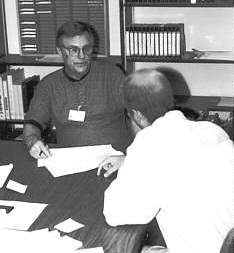| By Michael Wacht PALM COAST --"The long-term
relief is going to be emotional," said the Rev. Durwood Foshee, pastor of Palm Coast
United Methodist Church. "Tropical storms pop up, and the people can't handle it. For
us, it's not okay to say,‘we'll fix 40 or 50 houses and go on our way.' "
That's the Palm Coast church's stance and what's guiding its relief efforts as
headquarters for the Flagler Disaster Relief Coalition, which is assisting victims of the
wildfires that raged through large portions of Flagler and Brevard counties last July.
The coalition is an association of churches and local relief organizations, including Project Hope, the American Red Cross, United Way and several local civic organizations. Its
focus is twofold: give people whose homes were damaged or destroyed information on
available resources and the emotional support they need to recover.
"The emotional needs, if not met, will manifest themselves in very physical
ways," Foshee said, adding that local hospitals are likely to see an increase in the
number of people seeking help for anxiety and high blood pressure.
The church is offering weekly support groups, individual counseling and referrals through
a grant from the Federal Emergency Management
Administration (FEMA) and in cooperation with Project Hope. "Once FEMA runs out,
we may apply for UMCOR money to
meet the emotional needs," Foshee said.
Fire victims also need financial help and many who were forced to evacuate were already
living week-to-week, said the Rev. Peter Cottrell, chairman of the coalition and assistant
pastor at the Palm Coast church. "They lost 50 bucks from their paycheck, plus paid
$200 to get out of town," he said. "Many people are also feeling the economic
impact of leaving their water sprinklers on the roof for four days."
He says social service agencies and pastoral funds are stressed as well: "Every
church in the area was affected since they didn't take up offerings the Sunday after the
evacuation."
The area's financial needs also extend beyond the scope of the fires, Cottrell says.
"People are coming out needing help, but they needed help before the fires," he
said, adding he has spoken to people from outside the affected areas who claim to have had
fire or smoke damage.
Foshee said the church is trying to remain balanced in its efforts to help the victims.
"We are trying to treat them with dignity, grace and compassion, but we have to
remain objective in our assessments," he said. "We want to meet the unmet needs
people are going to have."
Cottrell said the next challenge will relate to insurance problems. Within the next six
months, insurance companies will be settling claims. He said that's when people who were
underinsured or defrauded by their insurance company will need help.
"I'm scared that when it happens, we won't be able to get the resources," he
said, explaining that national relief organizations have turned their attention to
Hurricanes Bonnie, Earl and Georges.
Cottrell said he and other relief effort organizers are still not experts in disaster
relief. "We're learning lessons," he said. "We'll be ready for the next
disaster."
Top of this page
© 1998 Florida United Methodist Review Online |
![]()
![]()
![]()
![]()
![]()
![]()
![]() Florida Southern College
Florida Southern College![]()
![]() Bethune Cookman College
Bethune Cookman College![]()
![]() FL
UM Children's Home
FL
UM Children's Home![]()

